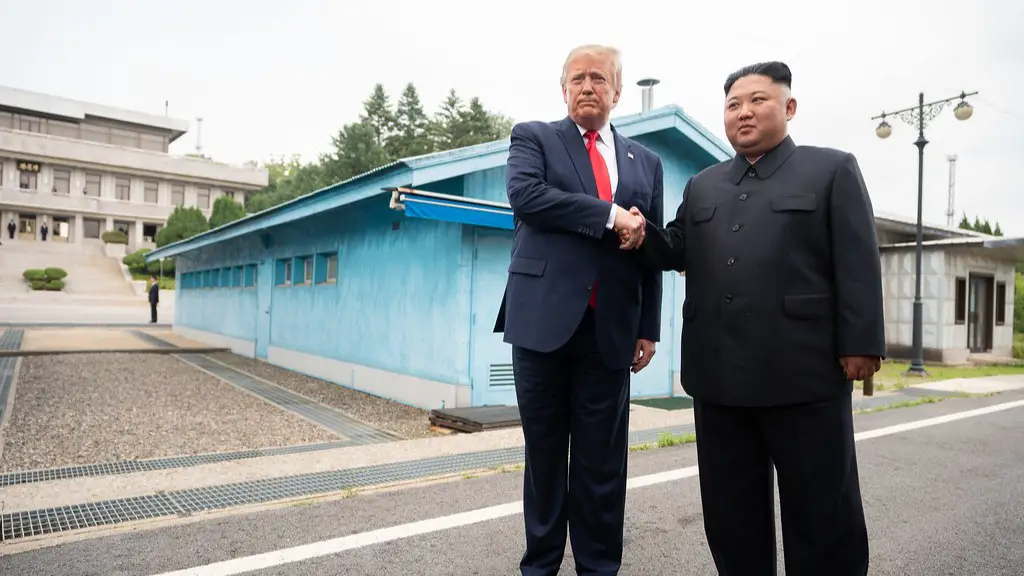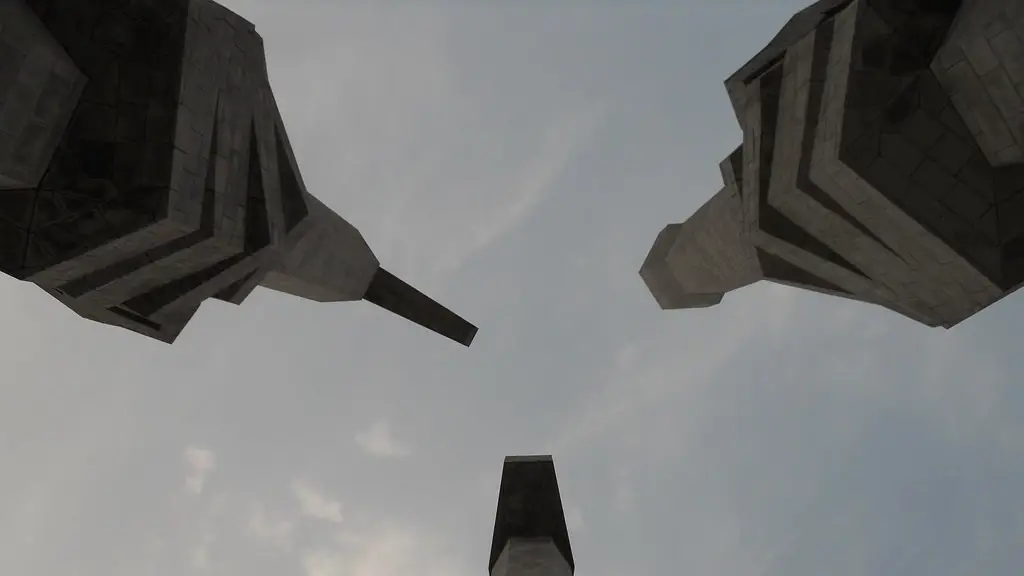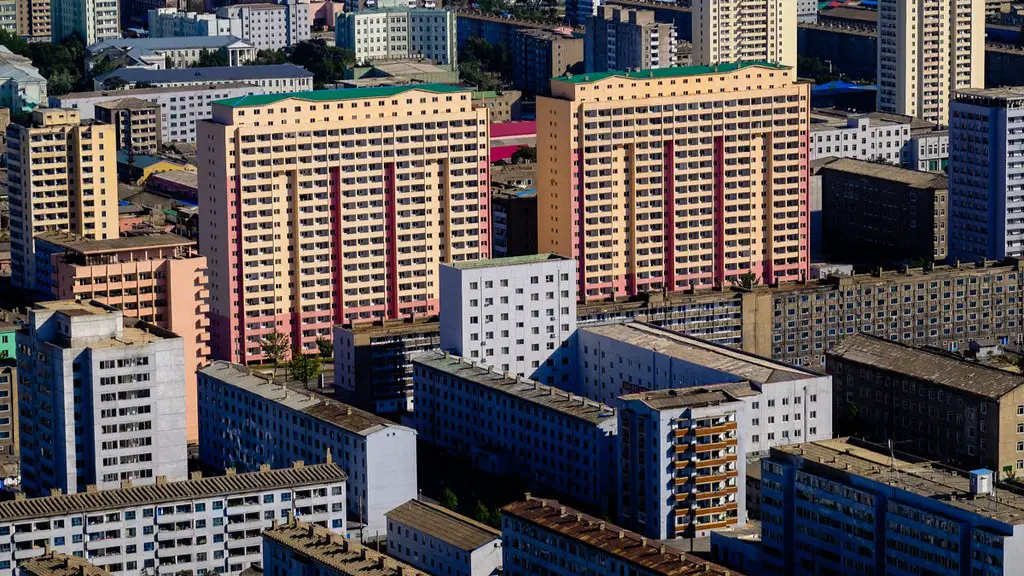North Korea, officially the Democratic People’s Republic of Korea (DPRK) is a country located in East Asia and arguably one of the most isolated nations in the world. Despite its isolation, centuries’ worth of customs and culture still remains to be appreciated by both locals and visitors. To get a glimpse of what life is like in North Korea, here is an examination of some of its most notable characteristics.
The first thing to be aware of is the incredible level of censorship in North Korea. This means that the news which is broadcast in the country is heavily regulated and often state-sanctioned propaganda. This results in citizens having a limited view of the outside world, and any information from foreign nations is usually heavily distorted or censored. The government also enforces a strict ‘dress code’ for its citizens in an effort to stifle any potential for ‘subversive’ behavior.
One of the most iconic aspects of North Korean life is the militaristic culture which pervades the country. Almost everyone in North Korea is required to perform military service at some point, beginning from childhood, as part of their education. This creates an environment of extreme loyalty towards the government, as it is seen as a duty to serve the nation.
On the other hand, it’s also important to note that North Korea has some of the world’s most advanced technology. From large-scale infrastructure projects to advanced telecommunications networks, the technological progress of the country has astounded international observers. This progress is heavily limited, however, due to the economic isolation and sanctions imposed by the international community.
Additionally, North Korea has very tight control over the use of its currency. In most places, two different currencies are used – domestic and foreign. Foreign currency is usually confiscated upon entering the country, and domestic currency must be used for all purchases. This makes living in North Korea quite restrictive for citizens, as it becomes difficult to access products and services from outside the country.
North Korea is also notorious for its heavily-monitored and oppressive human rights regime. Human rights abuses in the country are rampant and well-documented. Personal freedoms are severely limited, and citizens are forbidden to travel outside the country without explicit permission. Furthermore, citizens are subjected to constant surveillance and repressive laws, with severe punishments for even minor offenses.
Despite its reputation, many North Koreans are able to lead comparatively normal lives. Small pockets of relative freedom still exist within the country, where citizens can access outside information and maintain a certain level of autonomy. In contrast to the common perception of North Korea, many of even its poorest citizens are able to enjoy a certain degree of comfort and security due to the relative stability of the nation.
Economy
The North Korean economy is heavily controlled by the government, and limited trade with outside nations makes it difficult for the country to develop. The official GDP per capita is among the lowest in the world due to this lack of economic freedom and the sanctions imposed by the international community. Additionally, the economy relies heavily on antiquated industries and technologies, with agriculture and mining providing the bulk of the economic output.
This has resulted in extreme poverty in the country, though the actual extent of it is difficult to measure due to lack of information. The Government of North Korea has implemented a number of welfare programs to reduce the effects of poverty and aid those in need, though due to lack of resources, they are heavily underfunded. This has forced many citizens to rely on underground markets and black market activities to make ends meet.
Foreign investment is heavily restricted in North Korea, and most attempts at economic reform have been met with resistance from the government. This has resulted in a stagnant economy and little improvement in living standards for the citizens of the country.
Despite these limitations, there have been some positive developments in the North Korean economy in recent years. This includes the gradual implementation of market-based reforms, and the emergence of privately-owned businesses in the country. This could potentially help the country establish stronger ties with the global economy and improve its economic situation.
Politics
Beneath its authoritarian veneer, North Korea is actually a rather nuanced political system. Despite being tightly controlled by the ruling party, the country is surprisingly democratic in many ways. This includes a strong sense of civic participation and the right to vote for citizens, which is a stark contrast from many of its neighboring countries.
The North Korean government also follows a policy of peaceful coexistence with the international community. Many Western governments have imposed economic sanctions on the country due to its nuclear weapons program, but it is still willing to engage in international diplomacy and open dialogue with other nations.
International relations, however, are still tense due to the country’s nuclear weapons program. North Korea has always been unwilling to completely denuclearize and has refused to engage in meaningful disarmament talks. This has led to increased tension between the country and its neighbors as well as the international community as a whole.
The current political situation in North Korea is one of extreme volatility, due to the country’s refusal to abandon its nuclear weapons and the sanctions imposed upon it by the international community. Despite this, the country remains somewhat open to foreign influences, especially in the realm of culture and the arts.
That being said, the government is still firmly in control of the country, with no signs of any political liberalization in the near future. This means that the chances of any major change in North Korean policy, in the near future, are slim.
Culture
Despite the oppressive nature of North Korea, there are still aspects of traditional culture which remain intact. North Korean culture is a curious mix of ancient customs and modern influences, primarily from China and South Korea. This includes traditional food, music, and arts, some of which are quite distinct from those found in other parts of the world.
In recent years, there has also been a surge in popular culture in the country, including the emergence of dance clubs and western-style fashion. Though these activities are heavily regulated by the government, it is still possible to find places where people can enjoy themselves. Additionally, North Korea has a vibrant arts scene, with productions ranging from plays and musicals to film festivals.
Education is also held in high regard in North Korea, with a universal public education system which is one of the best in the world. This system emphasizes both rote learning and ideological indoctrination, though in recent years the government has been attempting to emphasize the development of skills and talents in the youth.
Finally, North Korea is also home to a unique form of government-sponsored patriotism. Citizens are encouraged to be loyal to the country, viewing it is as the source of all their blessings. This patriotism is strongly emphasized through propaganda and the celebration of nationalism, and is one of the few constants in the turbulent political landscape of North Korea.
Social Life
Despite its restrictions, social life in North Korea is surprisingly vibrant. Citizens are primarily made up of working class individuals, though there is a growing middle class in the larger cities. This allows for a greater range of social interactions and activities, though most are still subject to state regulations. This means that certain activities such as drinking and dancing are heavily restricted, and government permission must be obtained in order to engage in them.
When it comes to recreation, citizens are strongly encouraged to attend organized events, such as military parades and national holidays, as these form an important part of the nation’s identity. Additionally, citizens are often able to engage in leisure activities such as sports, music, and theater.
The government also actively encourages citizens to participate in leisure activities, providing subsidized prices for tickets to sporting events and concerts. Additionally, there are a number of state-funded organizations which focus on providing recreational activities and entertainment for citizens.
Apart from recreational activities, citizens are able to spend their leisure time in other ways, such as reading and socializing. This often takes place in public parks and green spaces, though it is still subject to state regulations. Additionally, citizens are also able to attend certain religious services, though only certain sanctioned faiths are allowed.
Travel
Though travel from North Korea is heavily restricted, it is still possible for citizens to leave the country legally. This is usually only done with the explicit permission of the government, though there have been cases where citizens have been able to leave the country without it. Additionally, citizens are also allowed to travel domestically, though this is usually done for educational or business purposes.
If one does receive permission to leave, it is often on the grounds of attending international conferences or sporting events. Additionally, there are a number of state-run organizations which focus on increasing cultural awareness and exchanging knowledge with other countries through official visits.
Travel to North Korea is also heavily restricted, and foreign nationals are generally forbidden from entering the country unless they receive explicit permission from the government. This means that citizens often must go through rigorous background checks and screening processes in order to visit. Additionally, foreign visitors are also subject to a number of restrictions and regulations while in the country.
Despite these restrictions, North Korea still possesses a unique charm which many visitors continue to experience. As a result, many travelers are left with an unforgettable experience which teaches them more about the country and its culture than they could have ever imagined.





